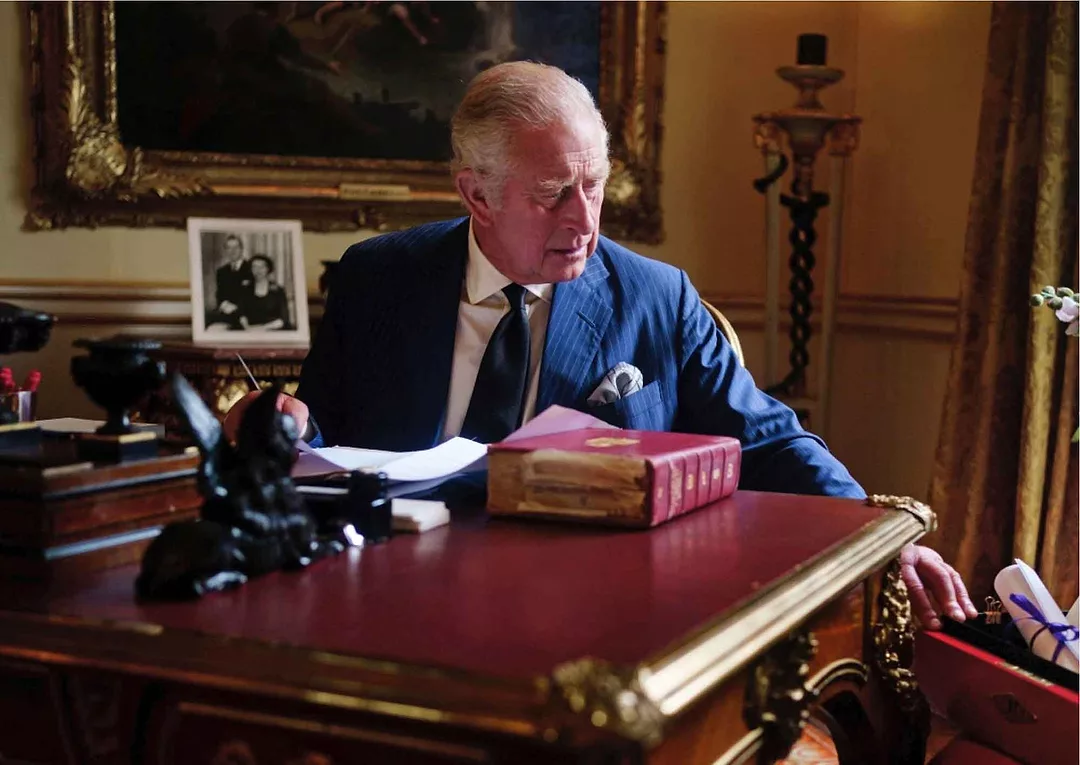Concord transcendentalist Ralph Waldo Emerson wrote about life being full of circles. And this year, with the passing of Queen Elizabeth II, Concord, Massachusetts, once again finds itself full circle back in a world tied to a King Charles; this time, King Charles III.
Concord’s early history was directly influenced by the first King Charles, the monarch of England, Scotland, Ireland, and the American colonies from 1625-1649. King Charles I’s religious reforms and the enthusiasm of his enforcers, including the infamous and cruel Archbishop Laud, drove Puritan ministers in England from their pulpits. Fearing for their lives, hundreds of Puritan ministers fled for America. Among them were Peter Bulkeley and John Jones, both of whom arrived in Boston in 1635. Here, Rev. Bulkeley and Rev. Jones met explorer Simon Willard and joined him in obtaining a land grant to establish the first inland town in America. They called the town Concord and founded it in 1635.
The next 100 years saw Concord’s growth into a thriving town, with some residents devoutly loyal to the Crown and others longing for independence. Turmoil in the English monarchy led to the head-first removal of King Charles I, the tempestuous succession of his son, King Charles II, and a lengthy struggle for control of the throne.

Charles I (1600-1649) by Anthony van Dyck
| public domainBy 1746, James Francis Edward Stuart (son of displaced King James II/VII of England, Scotland, and Ireland) was attempting to regain the throne of England, then occupied by King George II. Located mainly in Scotland, supporters of James Stuart were called Jacobites and rallied to James’ cause, gathering forces with James’ son, Charles Edward Stuart (aka Bonnie Prince Charlie). King George II amassed more regiments to deal with the growing rebellion in Scotland. Among King George’s troops gathering to quash the Jacobites was Scottish loyalist John Pitcairn, who, in approximately 30 years’ time, would find himself playing a significant role in Concord and American history.
On April 16, 1746, King George II’s army faced off with Bonnie Prince Charlie’s Jacobites at the Battle of Culloden on Culloden moor in Scotland. The Jacobite army was obliterated and the attempt to restore the Stuarts to the throne forever ended. Had the Jacobites won the battle, Bonnie Prince Charlie could have become King Charles III, but it was not to be, and King George II maintained control.
But that control was slipping away, particularly in America where, by the year 1775, colonists—including many Concord residents—were preparing to break from English rule, which was now (somewhat) under the control of King George III.

Amos Doolittle engraving showing British regulars gathering in front of the Wright Tavern, which still stands at the corner of Main Street and Lexington Road. Further up Main Street, near Keyes Road, once stood Jones’s Tavern. (public domain)
| public domainOn April 19, 1775, now at the rank of major, John Pitcairn led a regiment of Marines to Concord on an assignment to find and destroy military supplies the colonists were rumored to be hiding in town to supply a Continental Army. Arriving in Concord, the King’s troops split up to search the town. Remaining in the town center, Pitcairn and his men discovered a small stash of weapons, including two canons, in Jones’ jail yard. Placing the supplies in a pile, they lit them on fire. Embers from the fire flew and accidentally set the townhouse roof ablaze. The smoke was seen by minutemen and militia who were gathering about a half mile up the road at the North Bridge, leading them to believe the King’s troops were burning down Concord! A cascade of events followed, culminating in the Battle at the North Bridge and Concord militia leader Major John Buttrick’s fateful order to “Fire, fellow soldiers! For God’s sake, fire!” against the King’s troops. This was the first official open act of war against England and a major factor in the start of the American Revolution.
The rest is history, leading us to today where America is an ally and loyal friend of England. For more than a century, American forces have fought and served in wars beside English allies, including in World War II alongside (then) Princess Elizabeth, who was a trained driver and mechanic in the Auxiliary Territorial Services. Princess Elizabeth became Queen Elizabeth II, reigning with dignity for 70 years and 214 days. May she rest in peace.
And now, as Concord circles into a new world where once again there is a King Charles on the throne, we can truly say with good wishes, “Long live the King!”
To read more behind these Concord-related stories, visit the archives of Discover Concord magazine here:
Puritans, Witches & Kings and the Ousted Minister’s Flight to Concord - issuu.com/discoverconcordma/docs discoverconcordwinter20web/s/11483691
John Jones: Concord’s First Minister and Witch Hunter - issuu.com/discoverconcordma/docs/dc.fall22.fullbook/s/16741184
The Loyalist Guides of Lexington and Concord - issuu.com/discoverconcordma/docs/dc.fall22.fullbook/s/16740649
Major John Pitcairn’s High Road to Concord and Low Road Home - issuu.com/discoverconcordma/docs/spring20fullbook.low/s/1034401


